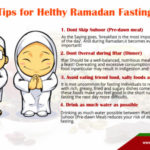Ramadan begins this week 27th May to 25th June, a time where many Muslims fast during the daylight hours.
Often people use Ramadan as an excuse to reduce the amount of exercise they participate in. However, it is important to continue with some physical activity, as without it and the absence of a regular eating pattern; one’s metabolism will slow down potentially resulting in weight gain.
Experts suggests the best time to undertake physical activity during Ramadan is either early in the morning after your first meal of the day or later in the evening after your meal.
“We noticed that many of our members disappear during the month of Ramadan,” said Naz Assafiri, exercise expert. “As a result people may lose muscle mass and find they put on a few extra kilos after the fast, so we really encourage people to continue with their exercise regime during this period.”
Dr Zahra Abdi offered some tips to assist with health and fitness during Ramadan:
- look at decreasing the length of your workout to between 30-45 minutes
- be consistent during this period, aim for 3 workouts per week
- your energy levels may be a bit lower than normal, so don’t concern yourself with the intensity of the workout. It’s OK to workout at a low to medium intensity level during this period
- keep well hydrated and aim to drink 1 gallon of water during the time you are allowed to drink
- eat a variety of foods and try to avoid saturated fats and sweets.
- Follow Nutrition Healthy Living Pyramid principles below.
Move More: ‘move more’ reminds us that we need to balance the energy (kilojoules) that we take in with the energy we use. We eat daily so we need to be active daily.
Eat Most: this base layer of food includes only plant foods: vegetables, fruits, nuts, dried peas, beans and lentils, breads and cereals (preferably wholegrain). These foods contain many different nutrients and should make up the bulk of the food we eat.
Eat Moderately: foods in the middle of the Pyramid include fish, lean meat, eggs, chicken (no skin), milk, cheese and yoghurt. Eating a serving of meat, fish or eggs and three servings of dairy foods each day will provide protein, minerals (especially iron and calcium) and B vitamins.
Eat in Small Amounts: sugars and fats are in this layer. These foods should be limited because they lack a good supply of the nutrients needed for growth, good health and quick energy.








